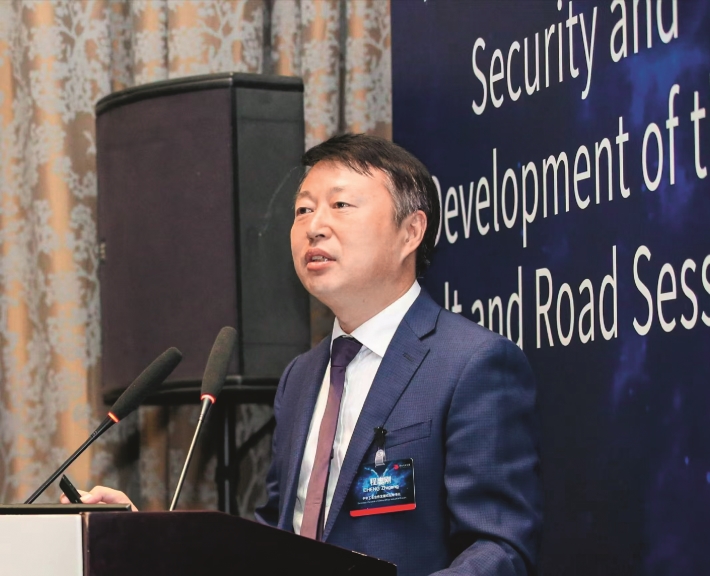|
||||||||||
| Home Top News Economy/Tech Culture/Sports China in Foreign Eyes Green Development Videos Intangible Cultural Heritages |
|
||||||||||
| Home Top News Economy/Tech Culture/Sports China in Foreign Eyes Green Development Videos Intangible Cultural Heritages |
| ChinAfrica |
| Speeding Up Industrialisation |
| China is an important partner in Africa’s pursuit of industrial development |
| By Xia Yuanyuan | VOL. 16 September 2024 ·2024-09-02 |
The Forum on China-Africa Cooperation (FOCAC) has always emphasised industrial development in its action plans.
In 2015, at the FOCAC Johannesburg Summit held in South Africa, China proposed 10 major cooperation plans, which include industrialisation. In August 2023, at the China-Africa Leaders’ Dialogue held in Johannesburg, China announced the launch of the initiative to support African industrialisation, the plans to help Africa to promote agricultural modernisation and a talent training project.
Thomas Utete Wushe, permanent secretary of the Ministry of Industry and Commerce in Zimbabwe, and Cheng Zhigang, secretary general of the China Africa Industrial Forum (CAIF), an organisation facilitating China-Africa exchanges and cooperation in diverse fields, talked to ChinAfrica on the achievements, opportunities and challenges of China-Africa industrial cooperation.

Cheng Zhigang: There is ample space for industrial cooperation
Industrialisation is the only way for Africa to achieve modernisation. Over 16 years after CAIF was established, as an important organisation promoting cooperation between China and Africa, it has facilitated more than 1,000 Chinese companies to invest and start businesses in Africa.
Africa is the most promising market and an important region for production capacity cooperation in the future. China-Africa cooperation has great potential. The gradual implementation of the China-Africa cooperation plans for industrialisation will continue to fuel Africa’s industrialisation processes and fill the gaps in the resource endowments of African countries. Some investment and cooperation projects in the industrial field are increasing tax revenue, generating employment, improving industrial structure, and extending the value-added chain of “made in Africa” for these countries. The broad coverage of the Belt and Road Initiative projects in Africa will provide important opportunities to achieve common development.
Complementary economies
The overall level of industrialisation in most African countries is relatively low, and the proportion of industry in the national economy is relatively small. The economic development within the African continent is also very unbalanced. The reasons for the current slow development in Africa’s industrialisation process include institutional and policy factors, as well as backward infrastructure, lack of funds and technology, insufficient talent reserves, and a series of other factors that limit the development of industrialisation.
Following the 2018 FOCAC Beijing Summit, various activities were successfully held, and many projects were implemented and completed in Africa. In 2023, China-Africa trade volume reached $282.1 billion, a year-on-year increase of 1.5 percent. China has maintained its position as Africa’s largest trading partner for 15 consecutive years. The scale of China-Africa trade has repeatedly hit new highs, and the structure has continued to optimise. Under the 10 cooperation plans, China has arranged and implemented more than 150 aid and trade projects for Africa. Without good infrastructure construction, Africa’s industrial transformation cannot develop competitive industries. At this stage, Africa’s industrial transformation has also brought development opportunities for Chinese companies, and they can take advantage of Africa’s resources to establish a new type of partnership.
China has been cooperating with African countries in various ways within its capacity to improve their infrastructure, enhance their independent development capabilities and achieve sustainable development. Under the FOCAC mechanism, Chinese companies have built more than 10,000 km of railways, nearly 100,000 km of roads, nearly 1,000 bridges, nearly 100 ports and a large number of hospitals and schools in Africa.
Robust cooperation
With the continuous upgrading of China-Africa cooperation, China is also strengthening its support for Africa. The FOCAC mechanism established in 2000 has played a positive role to this day. A number of projects supporting and assisting Africa in the fields such as railways, roads, hydropower, medical care, agriculture, and industrial parks have been built and put into use, greatly improving Africa’s infrastructure and environment.
As China’s economy grows, some labour-intensive industries are no longer suitable for the country’s stage of development. Africa, on the other hand, needs capital investment to utilise its massive labour advantages. Improvements in economic conditions year by year and the growing demand for industrialisation make Africa a good place for Chinese capital and industry to transfer to. Through this investment and transfer, in-depth cooperation between Chinese and African companies can open up a new common source of economic growth.

Thomas Utete Wushe: China is both a partner and inspiration for Africa’s industrialisation
Through FOCAC, China has played a pivotal role in shaping China-Zimbabwe relations, particularly in the context of Zimbabwe’s industrialisation. To date, some notable progress has been achieved.
The forum encourages Chinese firms to invest in Zimbabwean industries such as mining, agriculture, and manufacturing. This has positively contributed to modernisation and efficiency improvements through technology and expertise exchange. Dinson, a Chinese firm, has invested over $1 billion in a steel plant in Zimbabwe that is tipped to be the largest in Africa. Tian Ze Tobacco Co. has also invested in a tobacco processing plant in Zimbabwe.
Vital partner
Through various FOCAC summits, China has committed to funding and implementing infrastructure projects in Africa, enhancing connectivity and supporting industrial activities. Zimbabwe is home to many of these projects. For example, the Export-Import Bank of China provided funding for the expansion of Hwange Thermal Power Station, Huawei and ZTE contributed to ICT infrastructure development, and China Jiangxi International Economic and Technical Cooperation Co. has invested in Chitungwiza sewage system rehabilitation project.
FOCAC has promoted trade relations between China and Zimbabwe, offering frameworks for trade agreements that allow Zimbabwe to export more goods to China. This trade partnership helps to boost local production and promotes industrial growth as we aim to move the economy up the value chain.
A number of training programmes and workshops initiated through FOCAC have provided Zimbabwean workers and officials with skills and knowledge relevant to industrial sectors. This capacity building strengthens local industries by developing a more skilled workforce.
FOCAC promotes long-term relationships, which help in planning and implementing various industrial projects over time. This strategic approach allows for a more comprehensive development of Zimbabwe’s industrial base.
In summary, through various initiatives under FOCAC, China has fostered an environment conducive to Zimbabwe’s industrialisation and these efforts have helped to create more robust Zimbabwean industrial frameworks, supporting its overall economic development.

Employees remotely control underground mining equipment production operations at the Southeast Orebody Production Digital Control Centre of the Chambishi Copper Mine in Kitwe, Copperbelt Province, Zambia, on 4 June 4 (XINHUA)
Learning from China
African countries can learn from China’s footprints in a lot of ways. First, African states should focus on providing public goods such as education, research and development, and infrastructure. It is high time policymakers study a wide range of countries, industries, and measures to develop a broad customised “policy thinking” like what China did.
Second, in the pursuit of industrialisation, most members of society are not oriented towards long-term growth in productivity, but can only engage in local activities and pursue short-term benefits, thus deviating from the overall goal. Determining how to promote widespread recognition of and commitment to industrialisation by everyone in society is an important task for African countries to overcome limitations and achieve continuous progress.
Third, long-term cooperation and communication are necessary for the establishment of a new global market and industrial system that breaks free of the historic “chicken-or-egg” vicious cycle. China and Africa share the same overall goal of promoting industrialisation and, therefore, can overcome temporary barriers and setbacks through communication and adjustment.
Fourth, about 86 percent of Africa’s total trade is still conducted with other regions of the world, not within the continent. It is hoped that the African Continental Free Trade Area will increase intra-African trade opportunities, create a larger continental market, and act as a springboard for African industrialisation.
Fifth, bridging the gap between urbanisation and industrialisation is a major challenge for Africa. China has managed to conquer that problem and can assist most African countries with strategies aimed at attaining the same status.
Finally, manufacturing needs to be given dominant role in economic development. In the African Union’s Agenda 2063 and the industrial policies formulated by United Nations Economic Commission for Africa, manufacturing is clearly understood to be the foundation and key to the region’s job creation, economic transformation, and development.
China-Africa economic and trade cooperation presents vast opportunities, including:
First, there are opportunities in enhancing infrastructure connectivity across Africa, which is crucial for facilitating trade and economic integration. Secondly, Africa’s young and expanding population creates a rising demand for consumer products, technology, and services, providing opportunities for Chinese companies. Third, Africa is rich in natural resources, including minerals and agricultural products. Chinese companies can benefit from investments in these sectors, supporting resource extraction while helping African countries to develop their economies. Finally, there is ample room for mutually beneficial industrial cooperation given the specific stages of Chinese and African economic development, where China wants to reduce labour-intensive industries, and Africa is looking for investment to create more jobs for its huge labour force.
The future of China-Africa economic and trade cooperation holds significant potential, but it also requires careful navigation of the challenges involved. Both sides must work towards creating mutually beneficial partnerships that promote sustainable development, respect local communities, and boost economic resilience. By addressing these challenges proactively, China and African nations can enhance their cooperation and ensure long-term benefits for both sides.
| About Us | Contact Us | Advertise with Us | Subscribe |
| Copyright Beijing Review All rights reserved 京ICP备08005356号-5 京公网安备110102005860号 |